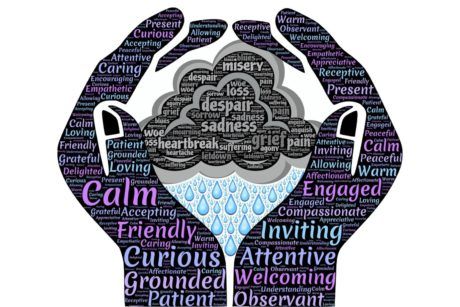Learn everything about Compassion Focused Therapy (CFT) and its application in counseling practice. Read more.
Access all courses in our library for only $9/month with All Access Pass
Get Started with All Access PassBuy Only This CourseAbout This Course
Who this course is for:
- Complementary Therapists
What you’ll learn:
- How to support individuals to relate to themselves and others with greater compassion
- How to help people manage distressing thoughts and behaviors
Requirements:
- No prior knowledge is required to take this course
Compassion-focused therapy (CFT) aims to help promote mental and emotional healing by encouraging people in treatment to be compassionate toward themselves and other people. Compassion, both toward the self and toward others, is an emotional response believed by many to be an essential aspect of well-being.
Its development may often have the benefit of improved mental and emotional health.
Trained mental health professionals may offer CFT in their practice to help and support individuals in treatment who wish to explore ways to relate to themselves and others with greater compassion.
According to CFT theory, the threat, drive, and contentment systems evolved throughout human history in order to facilitate survival. Early humans were eager to avoid or overcome threats, seek resources such as food or intimacy, and enjoy the benefits of being part of a social community. Proponents of CFT suggest these systems are still active and affect human emotions, actions, and beliefs today.
If a threatening stimulus is received, for example, a person may experience different feelings (such as fear, anxiety, or anger), exhibit various behaviors (submission or a fight or flight response), and develop certain cognitive biases (jumping to conclusions, stereotyping, or assuming it is always better to be safe than sorry).
The drive system endeavours to direct individuals toward important goals and resources while fostering feelings of anticipation and pleasure. People with an over-stimulated drive system may engage in risky behaviors such as unsafe sexual practices or drug and alcohol abuse.
The contentment system is linked with feelings of happiness. These feelings are not associated with pleasure seeking, nor are they merely present due to an absence of threats. Rather, this state of positive calm is typically tied to an awareness of being socially connected, cared for, and safe. This soothing system acts as a regulator for both the threat and drive systems.
CFT can be helpful to people who find it challenging to understand, feel, or express compassion, as therapy can be a safe place in which to discover any reasons behind this difficulty and explore methods of positive change. This type of therapy can also be effective at helping people manage distressing thoughts, behaviors, and feelings of any kind but may be particularly helpful when dealing with feelings associated with self-attack.
Other concerns treated with CFT include:
- Anxiety
- Shame
- Self-criticism
- Depression
- Disordered eating
- Anger
- Self-injury
- Psychosis
Our Promise to You
By the end of this course, you will have learned Compassion-focused therapy (CFT) to help promote mental and emotional healing.
10 Day Money Back Guarantee. If you are unsatisfied for any reason, simply contact us and we’ll give you a full refund. No questions asked.
Get started today!
Course Curriculum
| Section 1 - Introduction | |||
| Introduction | 00:00:00 | ||
| Course Overview | 00:00:00 | ||
| Introduction To CFT | 00:00:00 | ||
| The Circle Of Compassion | 00:00:00 | ||
| Therapists Role In CFT | 00:00:00 | ||
| Connecting With Compassionate Qualities | 00:00:00 | ||
| Evolution Old vs New Brain | 00:00:00 | ||
| Three Circle Model Of Emotion And Threat System | 00:00:00 | ||
| The Drive System And The Safeness System | 00:00:00 | ||
| The Social Shaping Of The Self | 00:00:00 | ||
| Attachment History And Attachment Style | 00:00:00 | ||
| Operant Conditioning And Functional Analysis Of Behaviour | 00:00:00 | ||
| Respondant Conditioning, Social Learning, And Mindfulness | 00:00:00 | ||
| Mindfulness Practices | 00:00:00 | ||
| Obstacles In Mindfulness Training | 00:00:00 | ||
| Working With Self Criticism | 00:00:00 | ||
| Method Acting Approach | 00:00:00 | ||
| Extending Compassion | 00:00:00 | ||
| Compassionate Letter Writting | 00:00:00 | ||
| Compassionate Thinking And Reasoning | 00:00:00 | ||
| Feeling Compassion | 00:00:00 | ||
| Creating Safe Place And Chair Work In CFT | 00:00:00 | ||
| Case Formulation | 00:00:00 | ||
| End Note | 00:00:00 | ||
| CFT Resources | 00:00:00 | ||
About This Course
Who this course is for:
- Complementary Therapists
What you’ll learn:
- How to support individuals to relate to themselves and others with greater compassion
- How to help people manage distressing thoughts and behaviors
Requirements:
- No prior knowledge is required to take this course
Compassion-focused therapy (CFT) aims to help promote mental and emotional healing by encouraging people in treatment to be compassionate toward themselves and other people. Compassion, both toward the self and toward others, is an emotional response believed by many to be an essential aspect of well-being.
Its development may often have the benefit of improved mental and emotional health.
Trained mental health professionals may offer CFT in their practice to help and support individuals in treatment who wish to explore ways to relate to themselves and others with greater compassion.
According to CFT theory, the threat, drive, and contentment systems evolved throughout human history in order to facilitate survival. Early humans were eager to avoid or overcome threats, seek resources such as food or intimacy, and enjoy the benefits of being part of a social community. Proponents of CFT suggest these systems are still active and affect human emotions, actions, and beliefs today.
If a threatening stimulus is received, for example, a person may experience different feelings (such as fear, anxiety, or anger), exhibit various behaviors (submission or a fight or flight response), and develop certain cognitive biases (jumping to conclusions, stereotyping, or assuming it is always better to be safe than sorry).
The drive system endeavours to direct individuals toward important goals and resources while fostering feelings of anticipation and pleasure. People with an over-stimulated drive system may engage in risky behaviors such as unsafe sexual practices or drug and alcohol abuse.
The contentment system is linked with feelings of happiness. These feelings are not associated with pleasure seeking, nor are they merely present due to an absence of threats. Rather, this state of positive calm is typically tied to an awareness of being socially connected, cared for, and safe. This soothing system acts as a regulator for both the threat and drive systems.
CFT can be helpful to people who find it challenging to understand, feel, or express compassion, as therapy can be a safe place in which to discover any reasons behind this difficulty and explore methods of positive change. This type of therapy can also be effective at helping people manage distressing thoughts, behaviors, and feelings of any kind but may be particularly helpful when dealing with feelings associated with self-attack.
Other concerns treated with CFT include:
- Anxiety
- Shame
- Self-criticism
- Depression
- Disordered eating
- Anger
- Self-injury
- Psychosis
Our Promise to You
By the end of this course, you will have learned Compassion-focused therapy (CFT) to help promote mental and emotional healing.
10 Day Money Back Guarantee. If you are unsatisfied for any reason, simply contact us and we’ll give you a full refund. No questions asked.
Get started today!
Course Curriculum
| Section 1 - Introduction | |||
| Introduction | 00:00:00 | ||
| Course Overview | 00:00:00 | ||
| Introduction To CFT | 00:00:00 | ||
| The Circle Of Compassion | 00:00:00 | ||
| Therapists Role In CFT | 00:00:00 | ||
| Connecting With Compassionate Qualities | 00:00:00 | ||
| Evolution Old vs New Brain | 00:00:00 | ||
| Three Circle Model Of Emotion And Threat System | 00:00:00 | ||
| The Drive System And The Safeness System | 00:00:00 | ||
| The Social Shaping Of The Self | 00:00:00 | ||
| Attachment History And Attachment Style | 00:00:00 | ||
| Operant Conditioning And Functional Analysis Of Behaviour | 00:00:00 | ||
| Respondant Conditioning, Social Learning, And Mindfulness | 00:00:00 | ||
| Mindfulness Practices | 00:00:00 | ||
| Obstacles In Mindfulness Training | 00:00:00 | ||
| Working With Self Criticism | 00:00:00 | ||
| Method Acting Approach | 00:00:00 | ||
| Extending Compassion | 00:00:00 | ||
| Compassionate Letter Writting | 00:00:00 | ||
| Compassionate Thinking And Reasoning | 00:00:00 | ||
| Feeling Compassion | 00:00:00 | ||
| Creating Safe Place And Chair Work In CFT | 00:00:00 | ||
| Case Formulation | 00:00:00 | ||
| End Note | 00:00:00 | ||
| CFT Resources | 00:00:00 | ||



